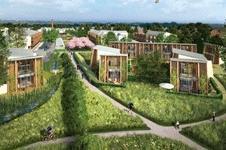Sites in Hampshire, Cornwall, Norfolk and Oxfordshire will go forward for full public consultation and local planning approval
Sites in Whitehill-Bordon in Hampshire, St Austell (China Clay) in Cornwall, Rackheath in Norfolk and North West Bicester in Oxfordshire will compete for £60m to develop demonstrator projects for the first wave of eco-towns.
The four schemes could provide zero-carbon settlements – including shops, restaurants and public buildings – for up to 30,000 people.
John Healey, housing minister, announced that the sites had all passed the government’s environmental and planning standards and would go on to the next planning phase: full public consultation and local planning approval.
“The successful eco-town sites will pioneer innovative design and infrastructure for greener living,” the communities department said in a statement. Green space would make up 40% of the eco-towns.
Environmental critics have previously accused the eco-towns of being unconnected to transport and therefore unsustainable while political opponents have said the process of choosing them is centrist and undemocratic.
However, the government said the schemes, six down on the ten promised by Yvette Cooper, were all: “big enough to function as a new settlement – but not isolated developments in the middle of the countryside” as well as being sufficiently funded and attracting widespread local support.
A decision on Middle Quinton in the West Midlands where actress Judi Dench and Formula One driver Johnny Herbert were among the 6,500 people objecting to plans for 6,000 eco-homes, will be taken in September.
Defending the low number of schemes on the approved list, Healey opened the door for a second wave of approvals. He said he wanted to see at least six second wave areas and is made up to £5m available for councils to conduct further planning work on proposals.
Each eco-town is to include a zero-carbon school by 2013.
The government received 18,000 consultation responses on the topic.



























3 Readers' comments